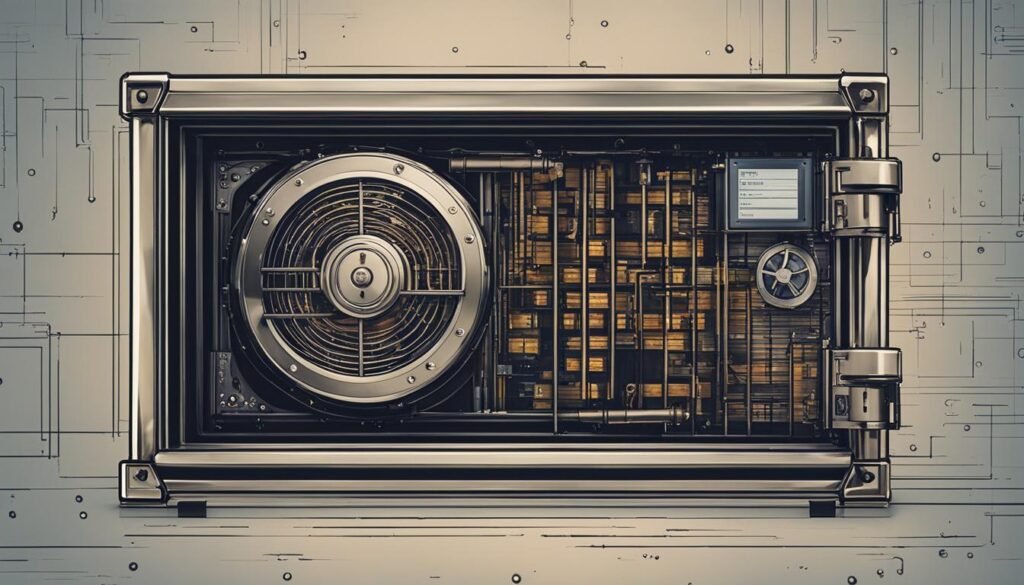In the world of cryptocurrencies, the popularity of self-custody has been growing rapidly. Many individuals choose to move their digital assets to personal wallets due to a lack of trust in crypto exchanges. However, it is important to note that just having a personal wallet does not automatically guarantee security. There are several crucial steps and security measures that you need to take to protect your crypto assets.
First and foremost, it is essential to educate yourself about digital assets and blockchain technology. Understanding how cryptocurrencies work and the potential risks involved will empower you to make informed decisions when it comes to securing your wallet and managing your assets.
Another crucial security measure is encrypting your recovery keys. These keys are the lifeline to accessing your crypto wallet and should be kept secure at all times. By encrypting them, you add an extra layer of protection against potential threats.
When choosing a wallet provider, thorough evaluation is necessary. Look for reputable providers with a proven track record in security and customer satisfaction. Take into consideration the pros and cons of self-custody versus third-party custody, and choose the option that aligns with your level of expertise and risk tolerance.
To further enhance the security of your crypto wallet, utilizing multi-factor authentication is essential. By requiring multiple forms of verification, such as a password and a unique code generated on your smartphone, you significantly reduce the risk of unauthorized access to your wallet.
Lastly, it is important to weigh the benefits and drawbacks of hot wallets and cold wallets. Hot wallets are connected to the internet and provide easy access for everyday transactions, but they are more susceptible to hacking. Cold wallets, on the other hand, are not connected to the internet, offering enhanced security but less convenience for frequent transactions. Consider using both types of wallets, keeping only the necessary amount of cryptocurrency in a hot wallet and storing the rest in a secure cold wallet for bulk storage.
By following these top security measures, you can ensure the protection of your crypto assets and have peace of mind in the dynamic world of cryptocurrencies.
Key Takeaways:
- Educate yourself about digital assets and blockchain technology to make informed decisions.
- Encrypt your recovery keys for added security.
- Choose a reputable wallet provider and evaluate the pros and cons of self-custody and third-party custody.
- Utilize multi-factor authentication for enhanced protection.
- Consider using both hot and cold wallets for a balance of convenience and security.
Choosing the Right Wallet: Custodial vs. Non-Custodial
When it comes to securing your cryptocurrency, choosing the right wallet is crucial. One of the key decisions you’ll need to make is whether to opt for a custodial or non-custodial wallet. Let’s explore the differences and help you make an informed choice.
A custodial wallet involves entrusting the management of your wallet to a trusted third party. This means that the responsibility for securing your assets lies with the wallet provider. On the other hand, a non-custodial wallet requires you to take full responsibility for your wallet’s security. In this case, you hold the private keys to your wallet and have complete control over your funds.
So, which option is right for you? It largely depends on your level of expertise and the amount of responsibility you’re willing to take. If you’re new to cryptocurrency or prefer a more hands-off approach, a custodial wallet can provide convenience and peace of mind. However, if you’re experienced and value the autonomy and security of managing your own keys, a non-custodial wallet may be a better fit.
| Wallet Type | Advantages | Disadvantages |
|---|---|---|
| Custodial Wallet |
|
|
| Non-Custodial Wallet |
|
|
Before making a decision, it’s crucial to research the wallet provider’s track record and reputation. Look for user feedback, transparency in their security protocols, and whether they have been subject to any major security breaches in the past. Consider your own risk appetite and determine which features and trade-offs align with your priorities.
Remember, the choice between custodial and non-custodial wallets is a personal one. Ultimately, what matters most is selecting a wallet that aligns with your level of expertise, desired responsibility, and overall security requirements.
Hot vs. Cold Wallets: Balancing Convenience and Security
When it comes to securing your cryptocurrency, one of the key decisions you’ll need to make is whether to use a hot wallet or a cold wallet. Each option has its own advantages and trade-offs, and understanding the differences can help you find the right balance between convenience and security for your needs.
The Benefits of Hot Wallets
A hot wallet is a cryptocurrency wallet that is connected to the internet. It provides easy access to your funds, allowing you to make quick transactions, manage your portfolio, and interact with decentralized applications. Hot wallets are typically software-based and can be accessed through desktop or mobile applications, making them convenient for everyday use.
Hot wallets are well-suited for frequent transactions and are often used for small amounts of cryptocurrency that you need to access regularly. They offer instant access to your funds and can be easily integrated with online platforms and exchanges. However, it’s important to note that hot wallets are more susceptible to hacking and security breaches compared to cold wallets.
The Advantages of Cold Wallets
In contrast, a cold wallet is a cryptocurrency wallet that is not connected to the internet. This offline storage solution provides enhanced security and protection against online threats. Cold wallets can take the form of hardware devices, such as Ledger Nano X or Trezor, or paper wallets, which involve writing down your private keys on paper and storing them in a secure location.
Cold wallets are ideal for long-term storage of large amounts of cryptocurrency that you don’t need to access frequently. By keeping your funds offline, you reduce the risk of cyberattacks and hacking attempts. Although cold wallets offer robust security measures, they can be less convenient for day-to-day transactions and require additional steps to access your funds.
| Hot Wallets | Cold Wallets |
|---|---|
| Connected to the internet | Not connected to the internet |
| Convenient for frequent transactions | Ideal for long-term storage |
| Accessible through software applications | Available as hardware devices or paper wallets |
| More vulnerable to hacking and security breaches | Enhanced security against online threats |
| Integration with online platforms and exchanges | Reduced risk of cyberattacks |
It’s important to note that while hot wallets and cold wallets offer different levels of convenience and security, they are not mutually exclusive. In fact, many cryptocurrency users choose to utilize both types of wallets to maximize the benefits of each.
A common practice is to keep a small amount of cryptocurrency in a hot wallet for everyday transactions, while storing the majority of your funds in a cold wallet for long-term storage. This approach provides a balance between accessibility and security, ensuring that your digital assets are protected while still allowing you to easily use them when needed.
By understanding the differences between hot wallets and cold wallets, you can make an informed decision about which option best suits your needs. Whether you prioritize convenience or security, finding the right balance is crucial for safeguarding your cryptocurrency investments.

Best Practices for Securing Your Crypto Wallet
When it comes to securing your crypto wallet and protecting your digital assets, following best practices is crucial. By implementing these practices, you can minimize the risk of unauthorized access and potential loss of funds. Here are some key steps you can take:
- Regularly backup your wallet: Take the time to create regular backups of your crypto wallet and store them in multiple encrypted locations. This ensures that even if your device is lost or stolen, you can still recover your funds.
- Utilize all available security features: Most crypto wallets offer additional security features such as seed or recovery phrases, regular software updates, and two-factor authentication. Enable these features to add an extra layer of protection to your wallet.
- Set strong passwords and be cautious of phishing attempts: Choose strong, unique passwords for your wallet and avoid sharing them with anyone. Be wary of phishing attempts, as attackers may try to trick you into revealing your wallet credentials through fraudulent emails or websites.
- Stay updated on security best practices: The world of crypto security is constantly evolving, so it’s important to stay informed about the latest security best practices. Regularly educate yourself about new threats and vulnerabilities, and adjust your security measures accordingly.
By following these best practices, you can significantly enhance the security of your crypto wallet and protect your digital assets. Remember, the responsibility for securing your wallet ultimately lies with you, so it’s essential to take proactive steps to safeguard your funds.

Cryptocurrency Wallets: Exploring the Different Types
When it comes to storing your cryptocurrencies, there are several types of wallets available. Each type offers its own unique features and levels of security. Understanding the different options can help you make an informed decision on which type of wallet is best suited for your needs.
Software Wallets
Software wallets are applications that you can install on your desktop or mobile devices. They provide easy access to your cryptocurrencies and are typically user-friendly. Software wallets can be further categorized into online wallets and desktop wallets.
Online wallets are cloud-based and accessible through a web browser. They offer convenience and accessibility but may be more susceptible to hacking attempts. It is important to choose a reputable and secure online wallet provider.
Desktop wallets, on the other hand, are software programs that you install on your computer. They offer greater control over your private keys and provide added security. However, it is essential to ensure that your computer is protected from malware or viruses that could compromise the security of your desktop wallet.
Hardware Wallets
Hardware wallets are physical devices that store your private keys offline. They resemble USB drives and offer enhanced security measures. Hardware wallets are considered one of the most secure options for storing cryptocurrencies.
By storing your private keys offline, hardware wallets protect your assets from online threats. They require you to physically connect the device to your computer or mobile device to initiate transactions, ensuring that your private keys never touch an internet-connected device.
Paper Wallets
Although less common nowadays, paper wallets are another option for storing cryptocurrencies. A paper wallet involves printing or writing down your private keys on a piece of paper. This offline storage method offers increased security as it is not susceptible to online hacking attempts.
However, it is crucial to properly generate and securely store your paper wallet. Care should be taken to protect it from physical damage, loss, or unauthorized access. Paper wallets are typically used for long-term storage and are not suitable for frequent transactions.
The Different Types of Crypto Wallets: A Comparison
| Wallet Type | Level of Security | Accessibility | Convenience |
|---|---|---|---|
| Software Wallets | Medium | High | High |
| Hardware Wallets | High | Medium | Low |
| Paper Wallets | High | Low | Low |
When choosing a cryptocurrency wallet, it is essential to consider factors such as security, accessibility, and convenience. Software wallets offer a balance between security and accessibility, making them suitable for everyday use. Hardware wallets provide the highest level of security but may be less convenient for frequent transactions. Paper wallets are a secure long-term storage option but lack the convenience of online access.
Ultimately, the best type of wallet for you will depend on your individual needs and preferences. It is recommended to utilize a combination of wallets to maximize security, such as keeping a smaller amount of cryptocurrency in a software wallet for daily use and storing the majority in a hardware or paper wallet for long-term storage.

Remember, regardless of the type of wallet you choose, it is crucial to follow best security practices. These include regularly updating your wallet software, enabling two-factor authentication, using strong passwords, and keeping your recovery phrases or private keys safe and secure.
By understanding the different types of cryptocurrency wallets and considering their unique features, you can make an informed decision to protect and secure your digital assets.
The Importance of Multi-Chain Wallets for Enhanced Security
When it comes to securing your cryptocurrency investments, one of the key considerations is the choice of wallet. While there are various types of wallets available, multi-chain wallets have emerged as a popular option for those looking to enhance security while managing multiple cryptocurrencies.
Multi-chain wallets offer secure storage for multiple cryptocurrencies in one place, eliminating the need for multiple wallets for different blockchains. This not only simplifies the user experience but also reduces the risk of errors or vulnerabilities associated with managing multiple wallets. With a multi-chain wallet, you can conveniently access and manage different cryptocurrencies without compromising security.
Enhanced security is a significant advantage provided by multi-chain wallets. These wallets undergo regular security audits and implement robust security measures to protect your digital assets. By consolidating your cryptocurrencies into a single wallet, you reduce the exposure to potential security risks associated with multiple wallets.
Moreover, multi-chain wallets offer interoperability, allowing you to seamlessly interact with different blockchain networks. This means you can easily send, receive, and exchange various cryptocurrencies within the same wallet. This level of flexibility not only streamlines your crypto management but also reduces the complexity and potential risks associated with using different wallets.
| Benefits of Multi-Chain Wallets | Enhanced Security | Streamlined Crypto Management | Interoperability |
|---|---|---|---|
| Explanation | Multi-chain wallets provide robust security measures and undergo regular audits to ensure the safety of your digital assets. | Consolidate your cryptocurrencies into a single wallet for easier management and reduced complexity. | Seamlessly interact with different blockchain networks, enabling easy sending, receiving, and exchanging of multiple cryptocurrencies. |
If you have diverse cryptocurrency holdings or frequently transact with multiple cryptocurrencies, a multi-chain wallet can be a valuable addition to your crypto portfolio. It offers a secure and convenient solution for managing your digital assets while minimizing security risks and simplifying your crypto management.

Key Takeaways:
- Multi-chain wallets provide secure storage for multiple cryptocurrencies in a single wallet.
- They enhance security by consolidating digital assets and implementing robust security measures.
- Multi-chain wallets offer streamlined crypto management and interoperability with different blockchain networks.
- Consider utilizing a multi-chain wallet if you have diverse cryptocurrency holdings or frequently transact with multiple cryptocurrencies.
Conclusion
Securing your crypto wallet and protecting your digital assets is of utmost importance in the ever-evolving world of cryptocurrencies. By following the right security measures, you can ensure the safety of your investments.
Start by choosing the right wallet based on your level of expertise and desired responsibility. Whether you opt for a custodial or non-custodial wallet, do thorough research on the wallet provider’s track record, user feedback, and security protocols.
A balanced approach between convenience and security can be achieved by utilizing both hot and cold wallets. Keep a small amount of cryptocurrency in a hot wallet for everyday transactions, while storing the majority in a cold wallet for bulk storage. Consider popular cold wallet options like Ledger Nano X or Trezor devices for enhanced security.
Remember to adhere to best practices, including regular backups, strong passwords, and two-factor authentication. Stay informed about different types of wallets and their advantages, such as software wallets, hardware wallets, and paper wallets. And if you manage multiple cryptocurrencies, consider the enhanced security of a multi-chain wallet.
By implementing these measures, you can confidently protect your crypto assets and navigate the exciting world of cryptocurrencies with peace of mind.
FAQ
Why is it important to secure your crypto wallet?
Securing your crypto wallet is crucial to protect your digital assets from theft and hacking attempts.
What is the difference between custodial and non-custodial wallets?
Custodial wallets rely on trusted third parties to manage your wallet, while non-custodial wallets require you to take full responsibility for security.
What are the advantages of hot wallets?
Hot wallets provide easy access for everyday transactions but are more susceptible to hacking attempts.
Why should I consider using both hot and cold wallets?
Using both types of wallets allows for a balance of convenience and security. Keep only the necessary amount of cryptocurrency in a hot wallet and store the rest in a cold wallet for bulk storage.
What are the best practices for securing a crypto wallet?
Regularly backup your wallet, enable two-factor authentication, use strong passwords, and be cautious of phishing attempts and scams.
What are the different types of crypto wallets available?
There are software wallets, hardware wallets, and paper wallets, each with their own features and levels of security.
Why should I consider using a multi-chain wallet?
Multi-chain wallets simplify the management of multiple cryptocurrencies, offer enhanced security, and provide interoperability and fault tolerance.





